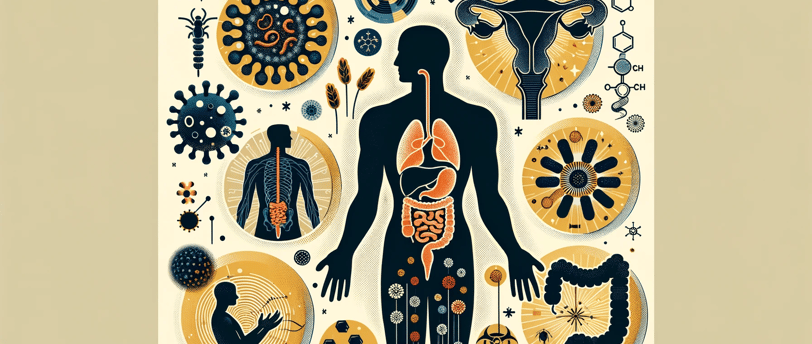Probiotics and Specific Health Conditions
Post 7 of 8: Probiotics have emerged as a versatile tool in the realm of health and wellness
PROBIOTICS
Fully Livin
10/26/20233 min read


Probiotics and Specific Health Conditions
Probiotics have emerged as a versatile tool in the realm of health and wellness, with a growing body of research demonstrating their efficacy in managing and preventing specific health conditions. In this section, we will explore how probiotics can be used to address gastrointestinal disorders, inflammatory bowel diseases, allergies, skin conditions, and urogenital health issues. Each of these applications is supported by case studies and scientific evidence.
Gastrointestinal Disorders
Diarrhea
Diarrhea, characterized by frequent loose or watery bowel movements, can result from infections, medication use (such as antibiotics), or various gastrointestinal conditions. Probiotics have shown promise in preventing and alleviating diarrhea through multiple mechanisms:
Scientific Evidence:
A meta-analysis published in JAMA Pediatrics found that probiotic supplements reduced the duration and severity of acute infectious diarrhea in children.
A study in Clinical Infectious Diseases indicated that the probiotic strain Lactobacillus rhamnosus GG was effective in preventing antibiotic-associated diarrhea in adults.
Constipation
Constipation, characterized by infrequent and difficult bowel movements, can also benefit from probiotic intervention. Probiotics can help by improving gut motility, increasing stool frequency, and softening stool consistency.
Scientific Evidence:
A study published in Alimentary Pharmacology & Therapeutics demonstrated that a combination of probiotics, including Bifidobacterium longum, significantly improved bowel function and quality of life in individuals with chronic constipation.
Case Study: A 45-year-old woman experiencing chronic constipation supplemented with a probiotic containing Bifidobacterium lactis. Her symptoms improved, with an increase in bowel movements and relief from abdominal discomfort.
Case Study: A 5-year-old child suffering from acute diarrhea was given a probiotic containing Lactobacillus rhamnosus and Lactobacillus reuteri. The frequency of diarrhea reduced significantly after three days, with complete recovery within a week.
Inflammatory Bowel Diseases (IBD)
Crohn's Disease and Ulcerative Colitis
Inflammatory bowel diseases (IBD), such as Crohn's disease and ulcerative colitis, are characterized by chronic inflammation in the digestive tract. Probiotics have gained attention as a complementary approach to managing IBD by modulating inflammation and supporting gut barrier function.
Scientific Evidence:
A randomized controlled trial published in Clinical Gastroenterology and Hepatology indicated that the probiotic VSL#3 reduced inflammation and improved clinical symptoms in patients with active Crohn's disease.
A systematic review in the World Journal of Gastroenterology highlighted that probiotics like Escherichia coli Nissle 1917 could be effective in maintaining remission in individuals with ulcerative colitis.
Allergies and Skin Conditions
Probiotics are increasingly recognized for their potential to reduce the risk of allergies and alleviate symptoms of conditions like eczema. The mechanism involves immune modulation and gut microbiome regulation.
Scientific Evidence:
A study published in Clinical and Experimental Allergy found that prenatal and early-life probiotic supplementation reduced the risk of eczema in infants.
Research in the Journal of Allergy and Clinical Immunology suggested that probiotics, particularly Lactobacillus rhamnosus GG, could reduce the severity of atopic dermatitis (eczema) symptoms in children.
Case Study: A 3-year-old child with atopic dermatitis experienced a significant reduction in skin symptoms and itching after six weeks of supplementation with a probiotic containing Lactobacillus rhamnosus GG.
Urogenital Health
Prevention of Urinary Tract Infections (UTIs)
Urinary tract infections (UTIs) are a common and often recurrent health concern, especially in women. Probiotics, particularly lactobacilli strains, play a vital role in maintaining urogenital health by preventing the colonization of harmful bacteria.
Scientific Evidence:
A meta-analysis published in the Archives of Gynecology and Obstetrics suggested that probiotics containing Lactobacillus strains reduced the risk of recurrent UTIs in women.
A study in the Journal of Clinical Gastroenterology and Hepatology found that Lactobacillus rhamnosus GR-1 and Lactobacillus reuteri RC-14 reduced the recurrence of UTIs in postmenopausal women.
Vaginal Health
Probiotics also have implications for vaginal health, helping to maintain a balanced vaginal microbiome and prevent issues like bacterial vaginosis and yeast infections.
Scientific Evidence:
A study published in BMJ Open indicated that the probiotic combination of Lactobacillus rhamnosus GR-1 and Lactobacillus reuteri RC-14 was effective in preventing recurrent bacterial vaginosis.
A randomized controlled trial in the European Journal of Obstetrics & Gynecology and Reproductive Biology demonstrated that oral probiotic supplementation with Lactobacillus rhamnosus and Lactobacillus reuteri reduced the occurrence of vaginal yeast infections.
In Conclusion
Probiotics have shown significant potential in managing and preventing specific health conditions, ranging from gastrointestinal disorders to inflammatory bowel diseases, allergies, skin conditions, and urogenital health issues. Case studies and scientific evidence underscore their efficacy and safety in various health applications.
It's essential to note that while probiotics offer promise in these areas, their effectiveness can vary depending on factors such as the specific strains used, individual health status, and dosage. It's advisable to consult with a healthcare professional before incorporating probiotics into your healthcare regimen, particularly if you have underlying health conditions or concerns. As our understanding of the gut microbiome and probiotics continues to expand, these beneficial microorganisms may play an even more prominent role in promoting holistic health and well-being.
